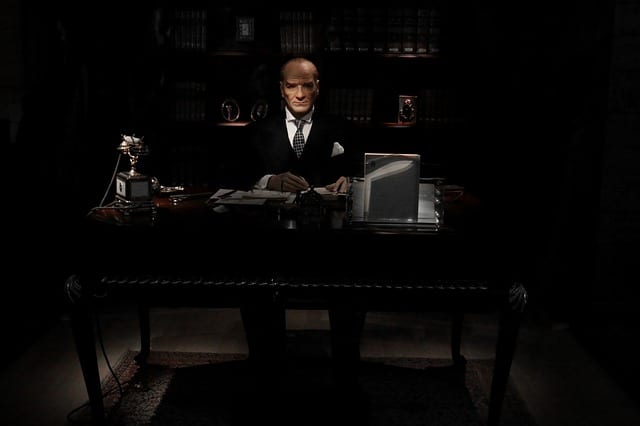The Turkish Tragedy
By John Dewey
Published in The New Republic, 12 November 1928
The tragedy in Turkey is more extensive than the sad plight of minorities. Those who have the patience to refrain in the Near East from a premature partisanship are likely soon to arrive at a state of mind in which all parties are so much to blame that the question of assigning responsibility is at most one of quantities and proportions. But a deeper and fuller acquaintance with the sufferings of all these peoples brings with it a revulsion. One becomes disgusted with the whole affair of guilt. Pity for all populations, minority and majority alike, engulfs all other sentiments —- except that of indignation against the foreign powers which have so unremittingly and so cruelly utilized the woes of their puppets for their own ends.
Prof. John Dewey
The situation in Turkey with respect to Turks, Armenians and Greeks alike meets all the terms of the classic definition of tragedy, the tragedy of fate. A curse has been laid upon all populations and all have moved forward blindly to suffer their doom.
It is a tragedy with only victims, not heroes, no matter how heroic individuals may have been. There are villains, but they are muffled figures appearing upon the open stage only for fleeting glimpses. They are the Great Powers, among which it is surely not invidious to select Russia and Great Britain by name. It is easy to become a fatalist in the presence of the history of Asia Minor and the Balkans; any one who would write history in terms of Providence is well advised to keep clear of these territories.
|
…The ruins of buildings of the Turkish population burnt by the Greeks in their retreat. |
|
| ..How accursed has been the minority population that had the protection of a Christian foreign power |
Brusa serves also as a symbol of another phase of the situation. We passed through the Jewish quarter, and found the Jews still in possession of their homes and property, the more flourishing perhaps because of the total absence of their former commercial competitors, the Greeks and Armenians. Unbidden the thought comes to mind: Happy the minority which has had no Christian nation to protect it. And one recalls that the Jews took up their abode in “fanatic” Turkey when they were expelled from Europe, especially Spain, by saintly Christians, and they have lived here for some centuries in at least as much tranquility and liberty as their fellow Turkish subjects, all being exposed alike to the rapacity of their common rulers. To one brought up, as most Americans have been, in the Gladstonian and foreign-missionary tradition, the condition of the Jews in Turkey is almost a mathematical demonstration that religious differences have had an influence in the tragedy of Turkey only as they were combined with aspirations for a political separation which every nation in the world would have treated as treasonable. One readily reaches the conclusion that the Jews in Turkey were fortunate that a Zionistic state had not been built up which should feel strong enough to intervene in Turkish politics and stimulate a separatist movement and political revolt. In contrast, the fate of the Greeks and Armenians, the tools of nationalistic and imperialistic ambitions of foreign powers, makes one realize how accursed has been the minority population that had the protection of a Christian foreign power.
|
…(The Armenians) burned at least a hundred Turkish villages and exterminated their population |
|
| …It is at least time that Americans ceased to be deceived by propaganda |
Dewey (1859-1952) later in life.
If human wit is baffled in seeking constructive measures which shall transform the tragic scene into one of happiness, history at least makes clear a negative lesson. Nothing but evil to all parties has come in the past or will come in the future from the attempts of foreign nations to utilize the national aspirations of minority populations in order to advance their own political interests, while they can conceal and justify their villainous courses by appeal to religion. After all the Turks are here; there is a wide territory in which they form an undisputed majority; for centuries the land has been their own; the sentiments have gathered about it that always attend long habitation. Whether we like it or not, other elements in the population must accommodate themselves to this dominant element, as surely as, say, immigrants in America have to adjust their political aspirations and nationalistic preferences to the fact of a unified national state. If a fiftieth of the energy, money and planning that has been given to fostering antagonisms among the populations had been given to searching out terms upon which the populations could live peaceably together without the disruption of Turkey, the situation today would be enormously better than it is. Whether the European great powers have learned the lesson that their protection and aid is a fatal and tragic gift, there is no way of knowing. But it is at least time that Americans ceased to be deceived by propaganda in behalf of policies which are now demonstrated to bring death and destruction impartially to all elements, and which are nauseating precisely in the degree that they are smeared over with sentiments alleged to be derived from religion. Finally, if slowly, the Turks also have been converted to nationalism. The disease exists in a virulent form at just this moment. It will abate or be exacerbated in just the degree in which the Turkish nation is accepted in good faith as an accomplished fact by other nations, or in which the old tradition of intervention, intrigue and incitation persists. In the latter case, the bloody tragedy of Turkey and the Balkans will continue to unroll.


Bir yanıt yazın